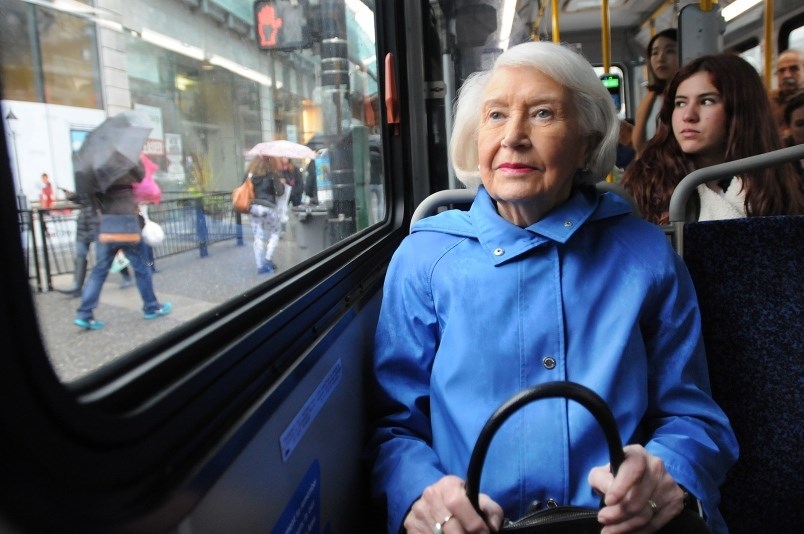“Transportation for seniors is a complex problem and solving it will require many different solutions” stated Isobel Mackenzie, the provincial Seniors Advocate, in a recent press release about her office’s latest report on seniors transportation.
Transportation is crucial for seniors if they wish to stay active, independent and involved in their communities.
As noted in response to the Seniors Advocate’s report on transportation, authors Stephanie Williams and Stephen D’Souza, both with a group of transportation advocates called Seniors on the Move, stated: “We know that transportation is a social determinant of health and is foundational to an independent, socially involved and active life for older adults.”
Mackenzie reports: “At the age of 65 approximately 90 per cent of B.C. seniors have a driver’s licence but this drops to approximately 44 per cent by the age of 85.” She further states, “It is challenging when we begin retirement with driving ourselves to activities and appointments but find, many years later, that we are still living independently and engaged with our community but we are not able to get ourselves out and about by car any longer.”
So it seems that as seniors age they require a variety of ways to get around including public transportation, ride sharing, taxis, handyDART, being driven by a friend, relative or caregiver, accessing a shuttle bus, walking, and so on.
But many of these transportation methods have their problems. Seniors may find it difficult using public transportation if they have some form of cognitive delay or mobility issue.
Also, bus stops may not have washrooms nearby or covered benches to sit on while waiting for a bus – both amenities many seniors have talked about through consultations and in small groups, such as in the City of North Vancouver Seniors Action Table.
North Vancouver seniors have approached TransLink and asked for more bus stops to decrease walking distance on select routes, more neighbourhood routes that go where seniors want to go and changes to Phibbs Exchange to ensure the safety and security of seniors.
In terms of other transportation options, HandyDART often has significant issues around wait times and some seniors might feel it carries a stigma. Seniors may be reluctant to rely on loved ones to ferry them around. For many North Vancouver seniors who would like to walk, they find that there is not enough covered seating at regular intervals and that there is a shortage of accessible washrooms. They have trouble navigating around sandwich boards, outdoor patios, skateboarders and bikes on sidewalks.
Seniors on the Move, a project of the Allies in Aging Project, is working to remove transportation barriers and reduce isolation amongst seniors in Metro Vancouver. Seniors on the Move, in their response letter to the Seniors Advocates report, are supportive of 12 of the 15 recommendations in the report.
They have suggested, however, that some of the options in the report are problematic and don’t consider some of the options already available that could be improved with public support. They stated, for instance, that: “one program, community shuttle buses was completely overlooked in the report.”
The North Shore Seniors Go-Bus, an example of this kind of service, (run on a shoe string by Silver Harbour Seniors’ Activity Centre), has long been the most talked-about solution to seniors transportation issues in Metro Vancouver. Instead, the Seniors Advocate has suggested a publicly funded program through the Home Care Support System.
It would make sense in my opinion to direct public money to resource successful community-based solutions like the Go Bus.
As Annwen Loverin, executive director of Silver Harbour says: “The North Shore Seniors Go Bus is an efficient way for seniors to get around their neighbourhoods, reduces the environmental impact of seniors driving single-occupancy vehicles, and provides an opportunity to connect socially with other riders. More generally speaking, it’s also very important for all of us to explore and practice different transportation options so that we’re comfortable getting around without our own car, in case we’re not driving at some point.”
Another suggestion in the Seniors on the Move letter to solving some of problems around senior’s transportation is creating a system to make information about transportation more readily available.
Two organizations, Better Environmentally Sound Transportation (BEST) and bc211, are acting to establish a Seniors Transportation Hotline and Resource Hub, so seniors looking for transportation options can call a specific number for more information.
When available, this number will connect users to a 24/7 multilingual hotline that will house all of the relevant transportation information for their region. For now though, North Shore seniors can get information about transportation options in the Seniors Directory published by the North Shore News.
Margaret Coates is the co-ordinator of Lionsview Seniors’ Planning Society. She has lived on the North Shore for 47 years and has worked for and with seniors for 20 of those years. Ideas for future columns are welcome Email: [email protected].



